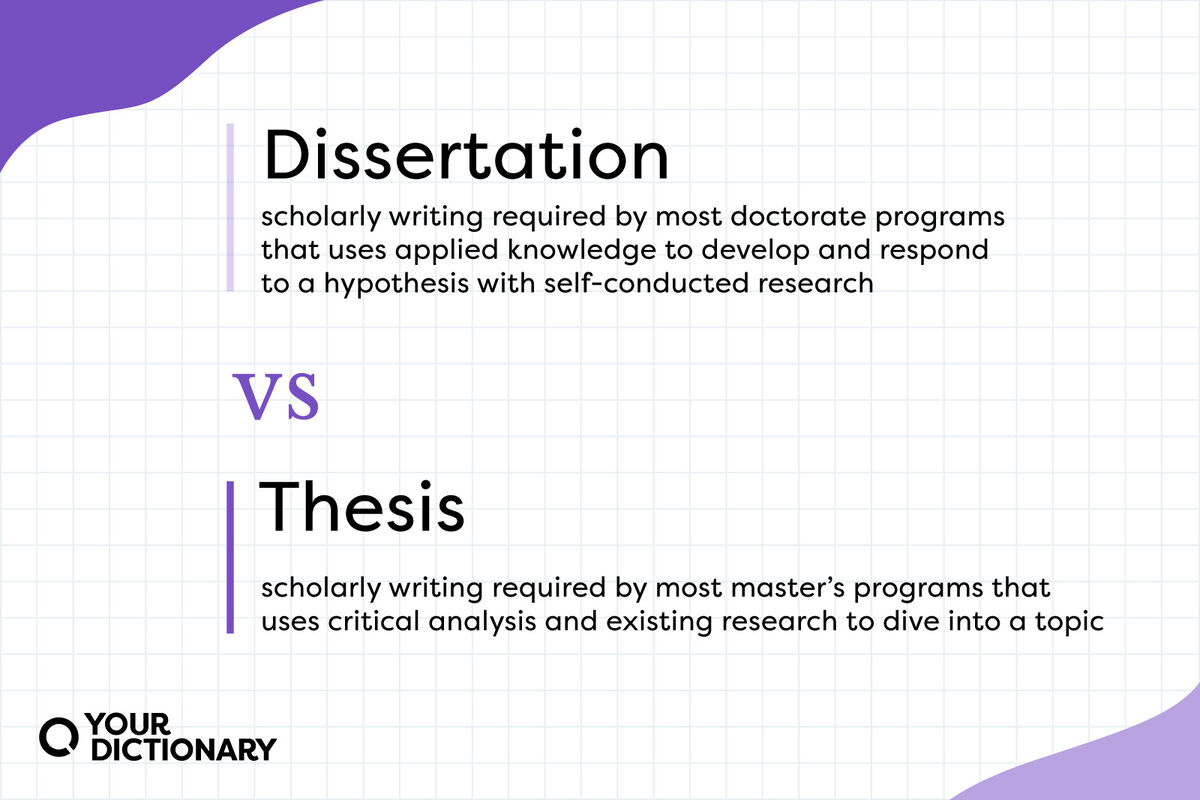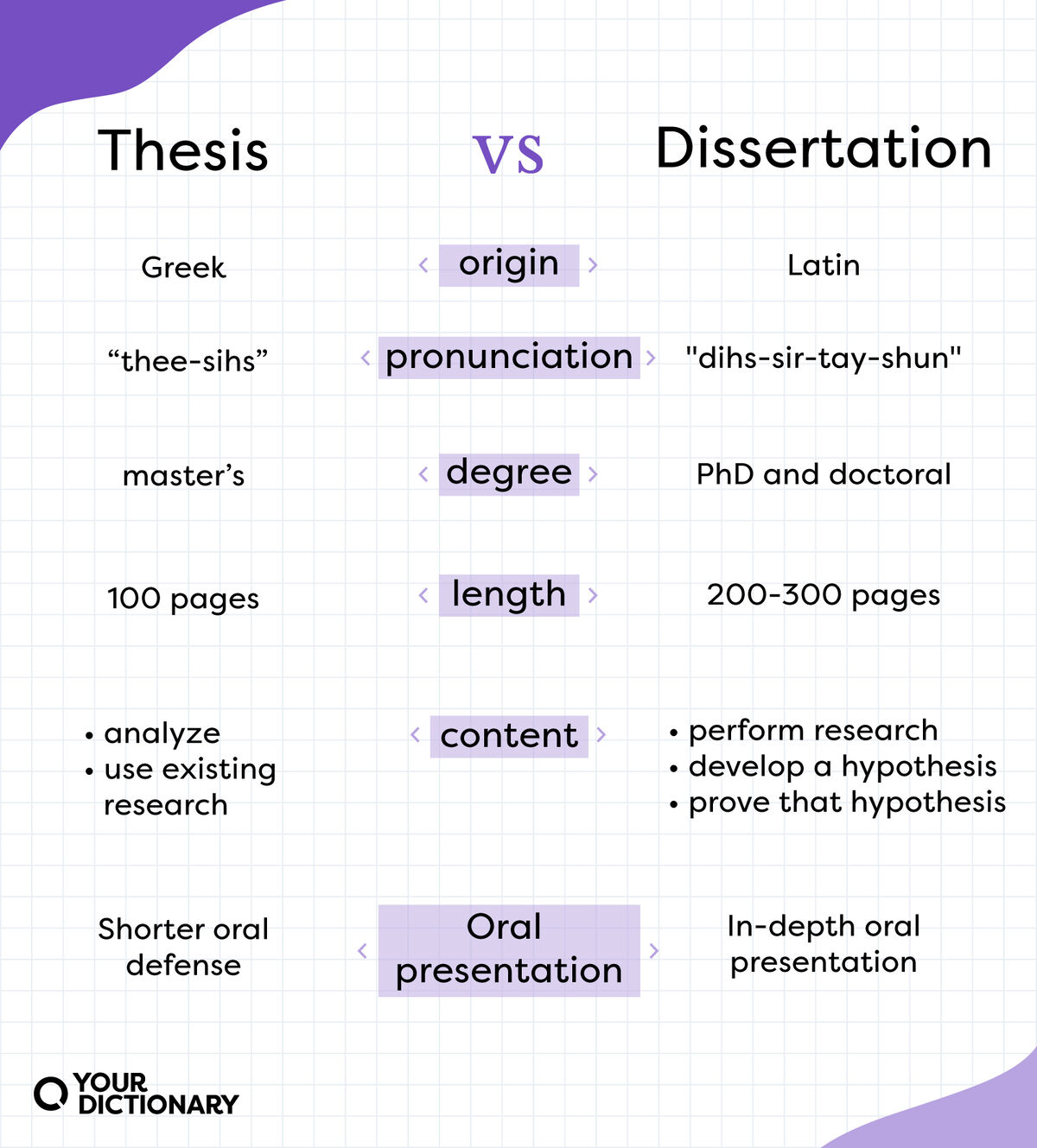
Unsurprisingly, graduate school is immensely challenging, forcing you to learn some real skills that will help you in your career while building new connections with other people in your field. If it was easy, everyone would have a graduate degree, but to really prove that you learned something in your graduate studies, schools will require you to write a dissertation or thesis to move on to the next phase of your life. But what is a dissertation or thesis?
What Is a Dissertation?
In its most general sense, a dissertation (pronounced “dihs-sir-tay-shun”) can refer to any formal discourse either written or spoken. The word comes from Latin dissertationem, meaning “a discourse, discussion, or disquisition.” That can include an essay, treatise, or even a sermon.
When most people talk about dissertations, they’re talking about a piece of writing usually (but not always) related to a doctoral program. In this context, a dissertation is a long-form piece of writing that uses your applied knowledge to respond to a question or proposition that you yourself have come up with.
By the time you finish your dissertation, you basically have a full book featuring your name as the author. Other people can then potentially use your dissertation findings in their own work.
Are Dissertations Only for PhDs?
Dissertations are common for Doctor of Philosophy degrees (PhDs). However, they are by no means the only doctoral programs that require a dissertation. Most (but not all) doctoral programs require dissertations. This is also why it’s sometimes referred to as a doctoral dissertation.
What Is a Thesis?
Thesis (pronounced “thee-sihs”) might be the more confusing of the two words. Originating from the Greek word meaning “putting, placing; an affirmation or proposition,” thesis is usually associated with essays as the thesis statement, or the main idea discussed in an essay or research paper. So even a dissertation will technically contain a thesis (statement).
Regarding grad school, thesis can also refer to a scholarly paper that allows you to dive deep into a chosen topic, expand on it, and otherwise show off what you’ve learned as a grad student. A thesis paper is sometimes called a master’s thesis because it is required for most master’s degree programs.
Can You Call a Dissertation a Thesis?
One of the factors that could contribute to the mixup between dissertations and theses (the plural form of thesis) is the phrase graduate thesis. Some schools and institutions use graduate thesis as an umbrella term for dissertations and theses, which is how you might get someone referring to a dissertation as a thesis.
What Is the Difference Between a Dissertation and Thesis?
The most notable difference between a dissertation and a thesis is the type of graduate program involved with each. Doctoral programs require dissertations, while master’s programs require theses.
While there is some general overlap in purpose, the dissertation and thesis have some major differences in content.

There are some variances here based on your school and program. You may, for example, end up writing a perfectly astute and well-accepted thesis that is fewer than 100 pages, and certain programs may not require an oral presentation of your thesis. In some rare cases, an undergraduate program might require a dissertation or thesis.
Which Is Higher: Thesis or Dissertation?
A dissertation is required at the technically higher degree level of doctorate, while theses are required by master’s programs. However, that’s an oversimplified way of looking at dissertations and theses, both of which have their own challenges. Depending on the program, you might have to complete both to graduate.
Dissertations and Theses in Europe
A lot of the above goes out the window once you go outside of the U.S. or North America. In Europe, doctoral programs may require both a thesis and a dissertation. The thesis may be completed as part of the program, which is then followed by a dissertation as a postgraduate research project.
What Is a Capstone?
Capstone (sometimes cap-stone) comes from the combination of cap and stone and is actually an architectural component. It’s the last stone affixed to the very top of a building or masonry wall. Capstone is also sometimes synonymous with keystone, which is the structurally integral stone placed at the apex of an arch.
In grad school, a capstone, or capstone project, is also a requirement for graduation. The project caps off your educational experience, building off the foundation of your learning. Think of it as a cherry on top of your grad school sundae.
Granted, it’s a lot more challenging than just that. Some capstones might include a thesis or dissertation, but capstones in general are meant to act as practical solutions for real-world problems. There is a physicality and practicality to capstones, while theses and dissertations tend to be more theoretical.
For example, a capstone might involve creating an actual phone app, policy, or lesson plan to solve an education problem. You would then present the capstone and get graded on it.